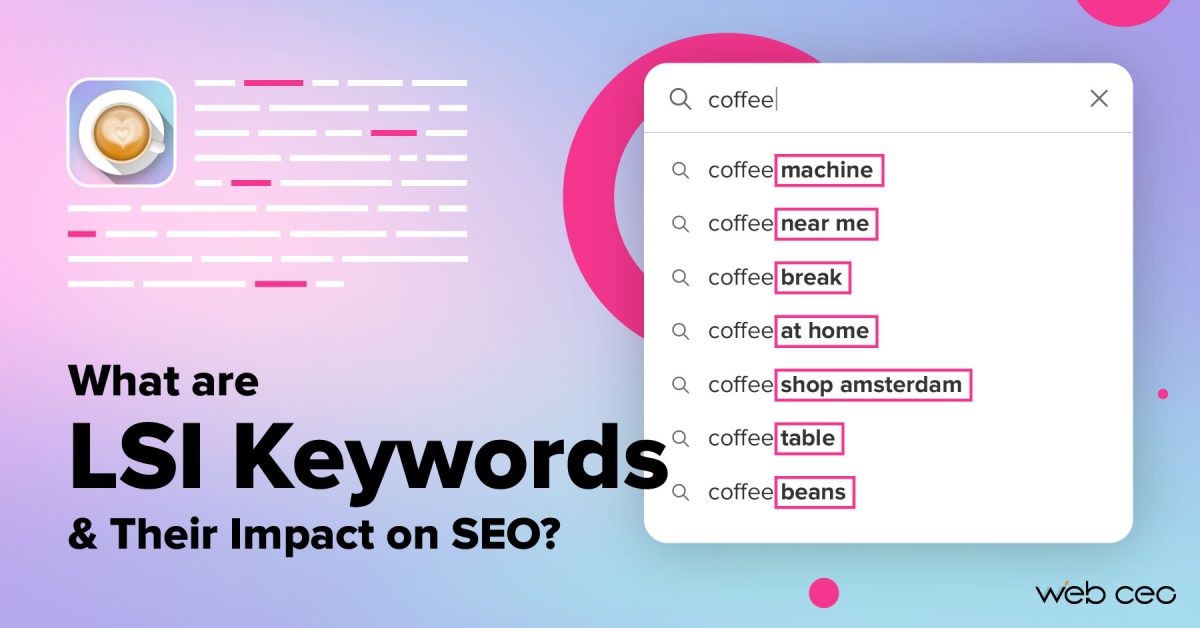
The SEO industry is fascinating and full of complex details that can turn your content strategy upside down. If you’ve been creating content relying solely on exact-match keywords, we’re ready to shake things up and introduce you to Latent Semantic Indexing (LSI) Keywords. If you already use LSI Keywords in your content, you will know how and where to find them.
SEO experts have been debating for years and putting forward many misconceptions about LSI keywords. But we are here to broach what LSI keywords are, explain their relevance, and provide actionable insights to incorporate them effectively into your content strategy.
Understanding LSI Keywords
LSI (Latent Semantic Indexing) keywords are a more advanced element of SEO. Whereas common keywords are at the beginner’s level, LSI keywords are marked with a star.
LSI keywords are also known as words and phrases that are semantically related to a primary keyword or topic. Search engines use LSI to understand the context and relevance of content, allowing them to provide more accurate search results to users.
For example, you have a web page dedicated to computer games. Your primary keyword might be “video games,” and LSI keywords would include terms like “gaming consoles,” “online multiplayer,” “game controllers,” or “virtual reality gaming.” These related terms help search engines like Google understand the broader context of your content and enhance its relevance to user queries.
In the past, search engines relied heavily on the number of keyword mentions to determine the relevancy of a page. However, this approach led to keyword stuffing and didn’t provide accurate results. With the evolution of search algorithms, search engines now analyze the usage of semantically related words to assess a page’s topic more effectively.
While Google has confirmed that the term “LSI keywords” is a misnomer, using semantically related words remains crucial for optimizing your content. By incorporating these related keywords, you can create comprehensive and contextually-rich content that ranks well on search engine result pages (SERPs).
LSI Keywords do not exist? What?
LSI keywords are just the name of the process by which search engines understand the context of your page. It doesn’t sound very easy and needs clarification, but we’ll explain it now.
Developed back in the 1980s, LSI is a powerful tool in the world of Natural Language Processing (NLP) that uncovers the hidden connections between words and enhances our understanding of information.
In a nutshell, LSI dives deep into our language and finds those subtle relationships between words that help us grasp the bigger picture. It’s like uncovering the secret code that unlocks the true meaning of content. By analyzing how words are used in a text, LSI can determine the underlying context and assist in indexing that information.
Now, you might be wondering how this relates to the controversial term “LSI keywords.” Here’s the scoop: while LSI can help identify synonyms and related words, there’s no concrete evidence that Google specifically uses LSI for this purpose. However, semantics play a vital role in how search engines comprehend a piece of content. It’s all about writing in-depth on a topic and incorporating those semantically related words and juicy synonyms that make your content shine.
Imagine you’re writing an engaging article about the fascinating world of wildlife. Sure, you’d naturally include words like “animals,” “habitats,” and “ecosystems.” But to truly captivate your readers and give search engines a clear signal of your content’s topic, you’d sprinkle in some synonyms and semantically related words. Think of it as adding colorful brushstrokes to your content canvas. You might mention “creatures,” “environments,” or “biological diversity” to paint a more comprehensive picture.
However, it’s important to note that LSI, as a technology, has evolved over time. It was originally designed for smaller document sets, not the vast expanse of the entire web. So while LSI may not be the driving force behind search engine algorithms, the underlying concept of semantic understanding remains crucial.
Ultimately, it’s not about getting caught up in the controversy surrounding the term “LSI keywords.” It’s about harnessing the power of semantics and embracing the idea that writing rich, detailed content on a topic naturally involves using synonyms and related words. So, dive into your content creation enthusiastically and let those semantically connected words flow, painting a vivid and engaging picture for your readers and the search engines.
Does Google Use LSI Keywords?
Google has made it clear that LSI keywords, as traditionally understood, don’t exist. They’ve confirmed it, and many other SEO experts echo this sentiment. But let’s unpack this a bit more.
LSI is, in fact, an older technology that predates the internet itself. However, its relevance to SEO lies in how Google can comprehend synonyms and those semantically connected words that breathe life into the content.
People describe the same topic using different words, and words themselves can carry multiple meanings. Consequently, relevant information might be missed while irrelevant content gets retrieved.
But here’s the thing: while Google seeks to understand these nuances when indexing web pages, it doesn’t mean they’re using Latent Semantic Indexing (LSI) as the underlying technology.
So, what does this mean for you as a content creator striving for search engine visibility? Well, even if LSI Keywords isn’t the precise term to capture this phenomenon, it’s crystal clear that you should carefully choose your words to help Google comprehend the essence of your content.
Think of it like this: you’re having a heartfelt conversation with Google and want to ensure it truly grasps what you’re talking about. Just like selecting the right words and examples helps a friend understand your thoughts, using well-chosen words in your content helps Google decipher your topic accurately.
While the exact mechanisms behind Google’s understanding of relationships between words remain mysterious, one thing is certain: the top-ranking content on search engine results pages (SERPs) covers a topic extensively, showcasing authority and expertise. So, whether you call them LSI Keywords or not, the lesson here is to mindfully craft your content with carefully chosen words, allowing Google to perceive your expertise and elevate your content to the top.
Where to Find Semantically Related Words?
When we understand the significance of semantically related words in optimizing our content, the next question is: where can we find these hidden gems?
Here are a few options you can start!
Add Your Keywords to a People Also Ask tool
Go to alsoasked.com and add your primary keyword. You will get a big tree of PPA boxes showing you which keywords you can use. Some of these questions may be useless, but you can also find many themes for your articles.
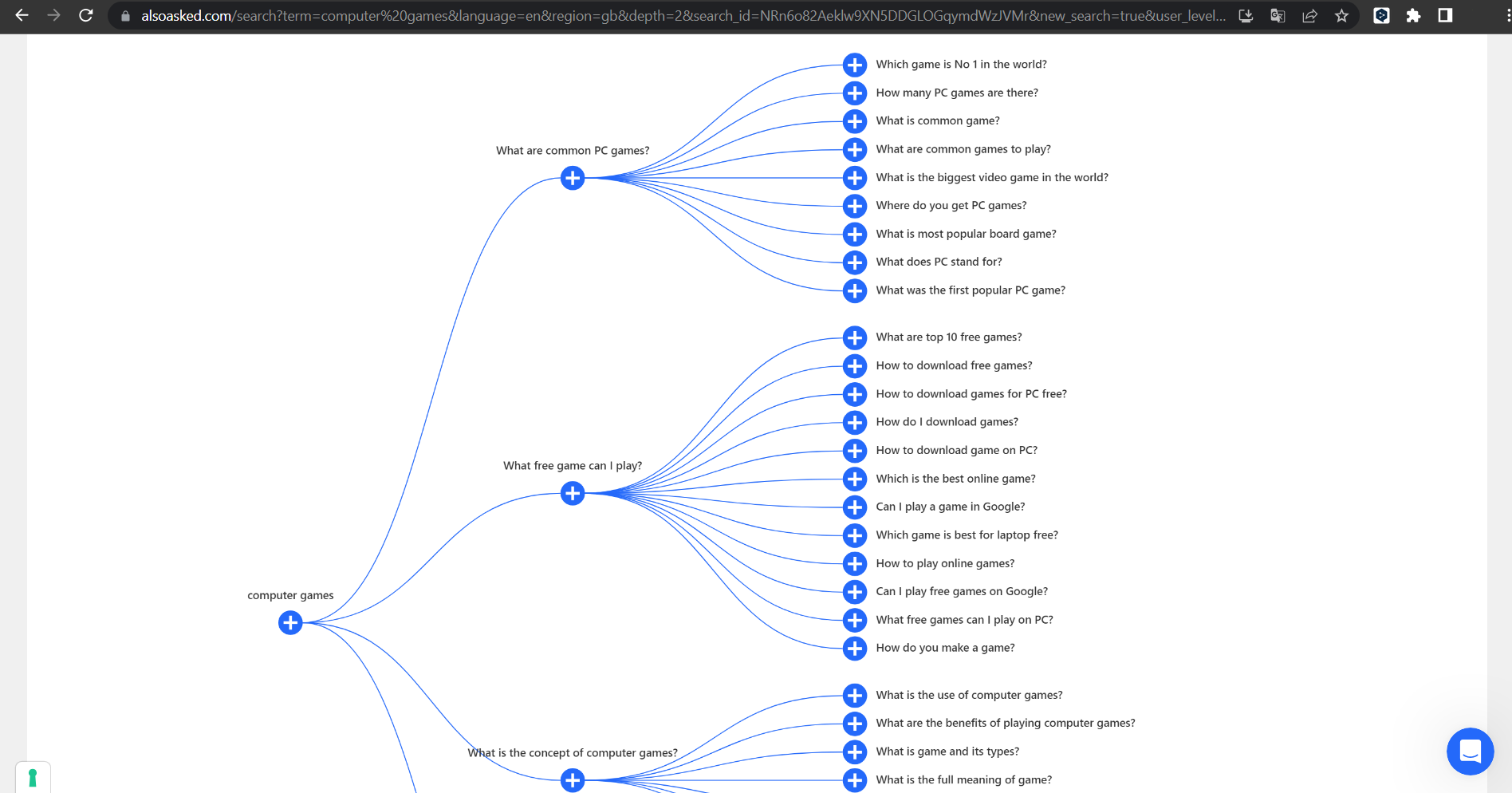
Use Google Autocomplete
Google Autocomplete offers a swift and effective method to unearth related keywords to enhance your content. Visit Google and input your primary keyword, but do not hit the search button. Instead, direct your attention to the autocomplete suggestions that promptly appear, granting you valuable insights into related terms. Let’s add “computed games” and find some good related keywords.
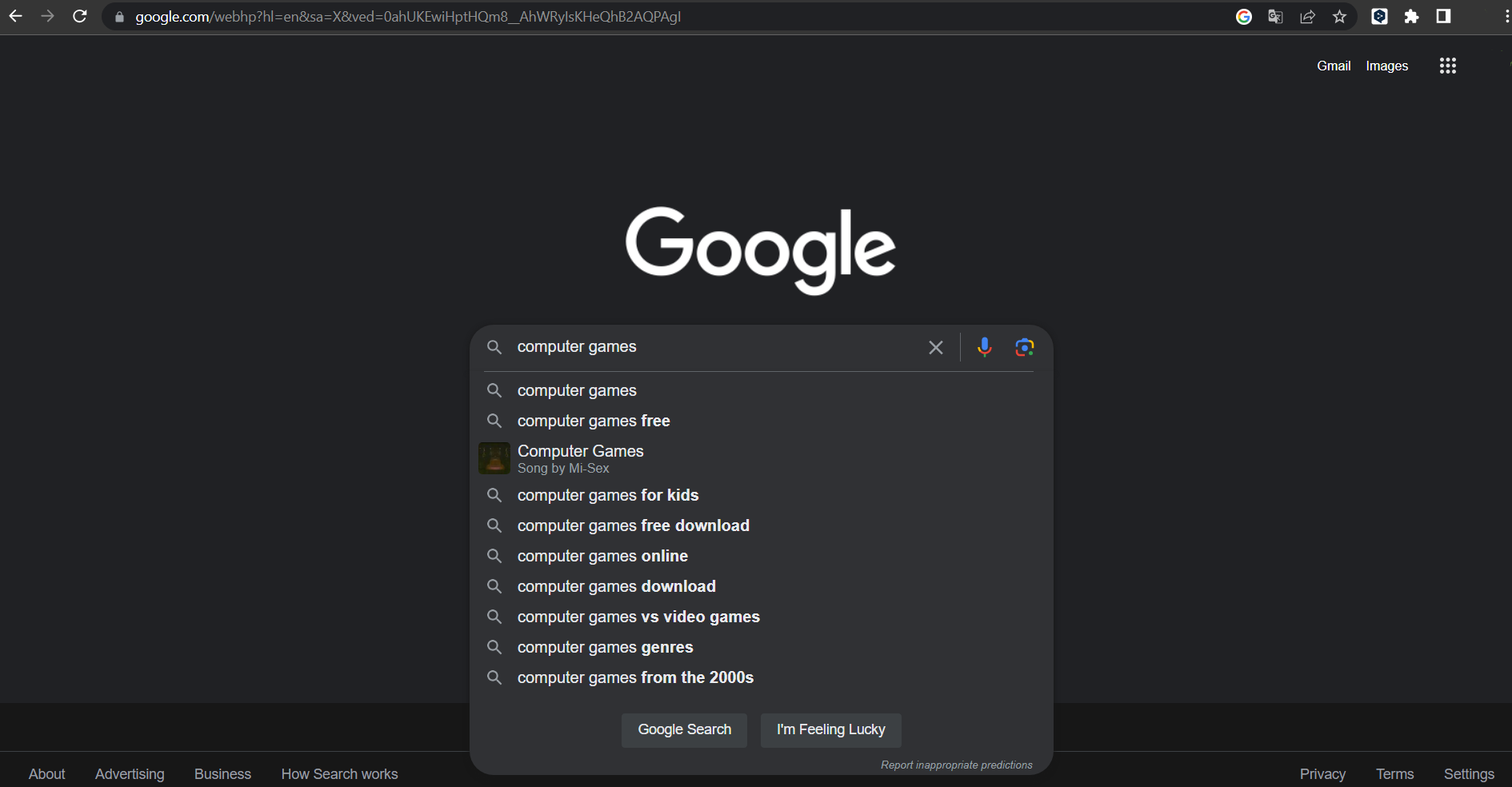
Use the suggested words wisely. Some of them may not be relevant to you. For example, if you do not have child content and your website does not specialize in kids, you do not need to use “computer games for kids.”
Check “Related searches to” at the bottom of a Google search page
To unlock a wealth of semantically related words and discover fresh topics, simply enter your keyword in a Google search and navigate to the bottom of the page. There, you’ll find a list of related searches that can serve as a wellspring of inspiration.
Take advantage of the settings to personalize your search, enabling Google to present results tailored to your search history. Let’s check some examples.
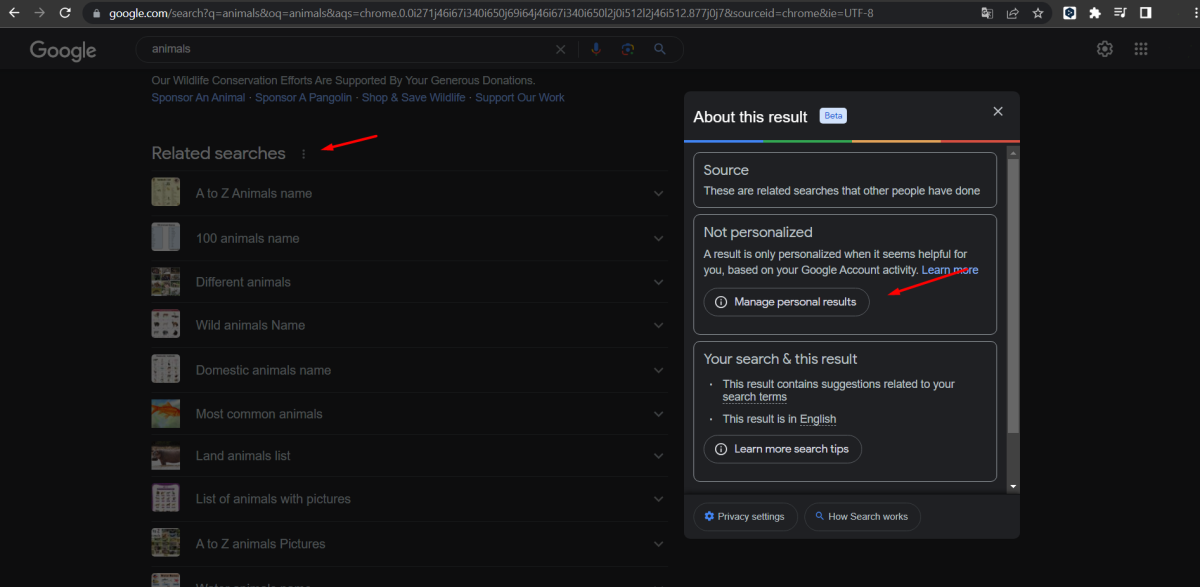
I added “animals,” and here is what I got:
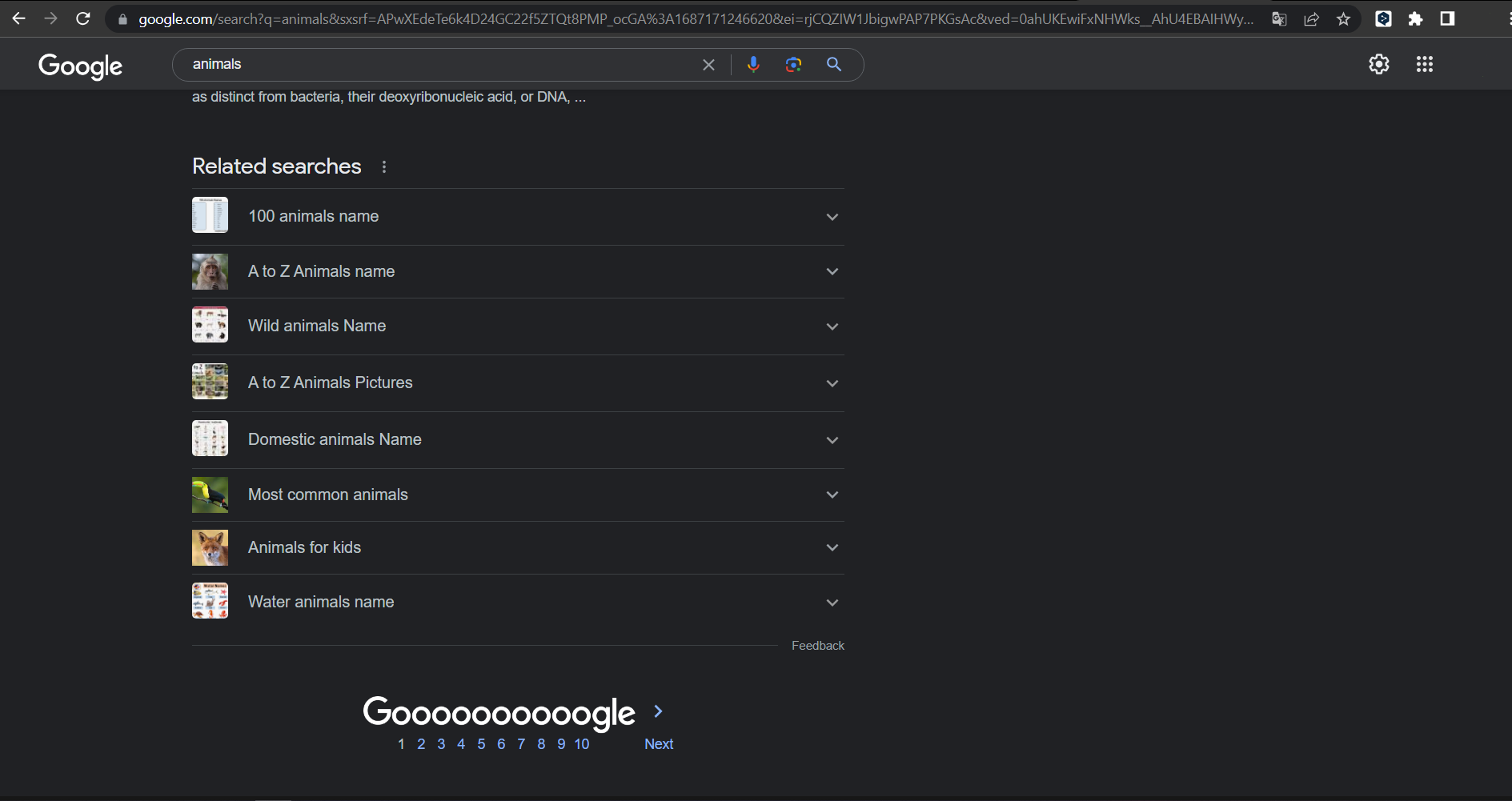
NOTE: Use the suggested words wisely. Some of them may not be relevant to you at all.
Communicate on different social media platforms
You can also explore online forums, social media platforms, and Q&A websites like Quora or Reddit. These platforms often host discussions and conversations about specific topics, and by exploring the relevant threads and posts, you can identify LSI keywords used by real people.
Use The WebCEO Keywords Research Tool
Find thousands of keyword suggestions with WebCEO’s Keyword Research tool.
Apart from the great keyword suggestions regularly found in the Google Keyword Planner, WebCEO finds popular keyword phrases from the Google search bar autocomplete, the People also ask widget, and other sources.
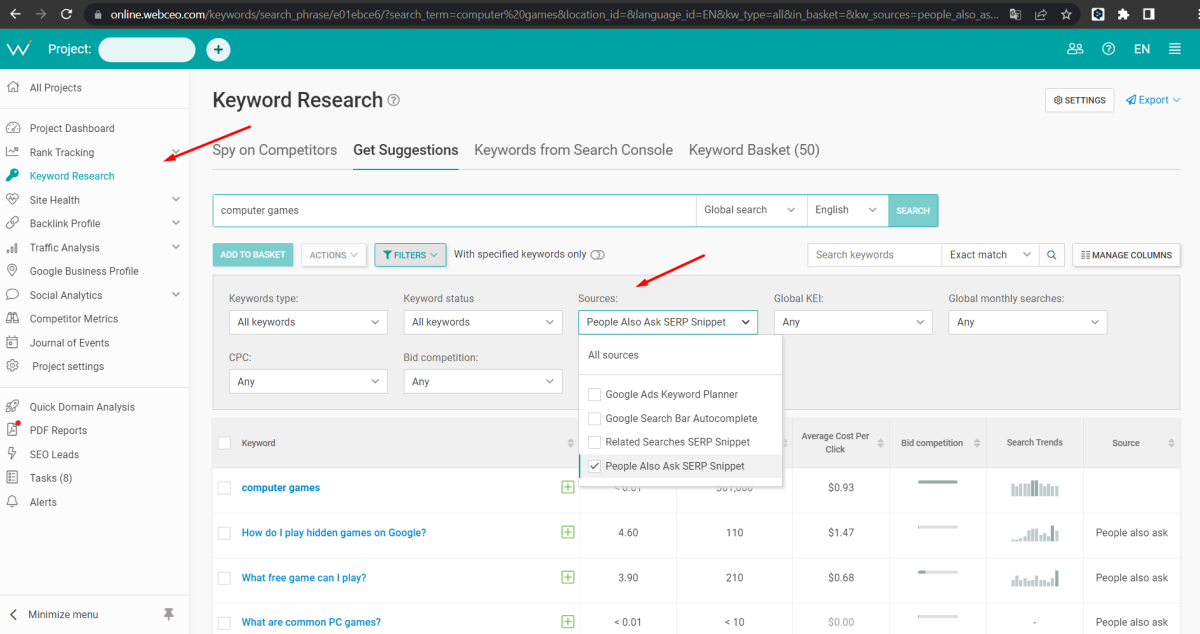
Conclusion
LSI keywords play a significant role in optimizing your content for search engines. While the term “LSI keywords” may be a misnomer, the concept of incorporating semantically related words remains essential. By understanding your content’s broader context and relevance, search engines can provide more accurate search results to users.
Remember, it’s not just about incorporating keywords—it’s about creating valuable, informative, and engaging content that resonates with both search engines and your audience.


